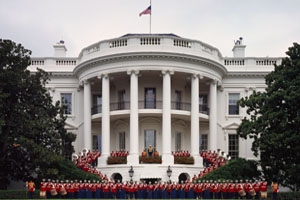Humanities
The 13 Keys to the White House

Who will become the next president of the United States? It’s a question that’s stumping even the most seasoned pundits.
Luckily, American University's Distinguished Professor of History Allan Lichtman is offering a tried-and-true formula that has correctly predicted every presidential election outcome since Ronald Reagan’s 1984 re-election.
In 1991, Lichtman and coauthor Ken DeCell published The 13 Keys to the White House (Madison Books, 1991), a book laying out the 13-key forecasting system initially developed in 1981 by Lichtman and renowned mathematician Vladimir Keilis-Borok. They developed the keys based on their analysis of trends in presidential campaigns since 1860. The 13 keys are simple to use: if 8 or more of the 13 keys are true for the incumbent party, its candidate will win the election—but if fewer than 8 are true, the challenger will win.
The 13 Keys
- Party mandate: After the midterm elections, the incumbent party holds more seats in the US House of Representatives than after the previous midterm elections.
- Contest: There is no serious contest for the incumbent party nomination.
- Incumbency: The incumbent party candidate is the sitting president.
- Third party: There is no significant third party or independent campaign.
- Short term economy: The economy is not in recession during the election campaign.
- Long term economy: Real per capita economic growth during the term equals or exceeds mean growth during the previous two terms.
- Policy change: The incumbent administration effects major changes in national policy.
- Social unrest: There is no sustained social unrest during the term.
- Scandal: The incumbent administration is untainted by major scandal.
- Foreign/military failure: The incumbent administration suffers no major failure in foreign or military affairs.
- Foreign/military success: The incumbent administration achieves a major success in foreign or military affairs.
- Incumbent charisma: The incumbent party candidate is charismatic or a national hero.
- Challenger charisma: The challenging party candidate is not charismatic or a national hero.
So, who does Lichtman predict will win the 2016 election? He says at this moment, months before the election, the pivotal keys appear to be numbers 2 and 11. “The outcome of the 2016 general election will hinge on whether Democrats continue their bitter and protracted nomination struggle,” Lichtman says, “and whether President Obama can sell his foreign policy initiatives to the American people as one or more major triumphs for the United States.”